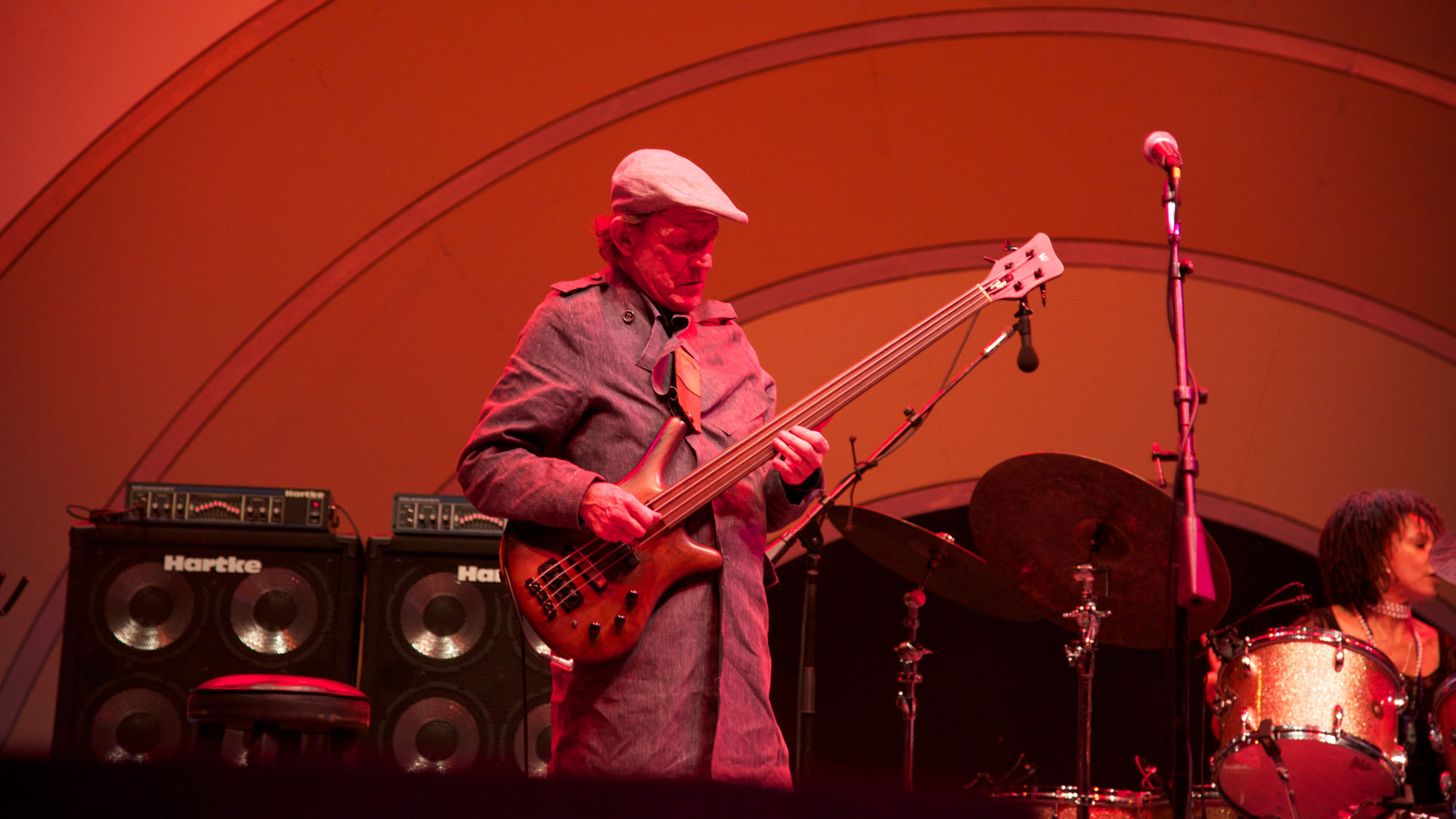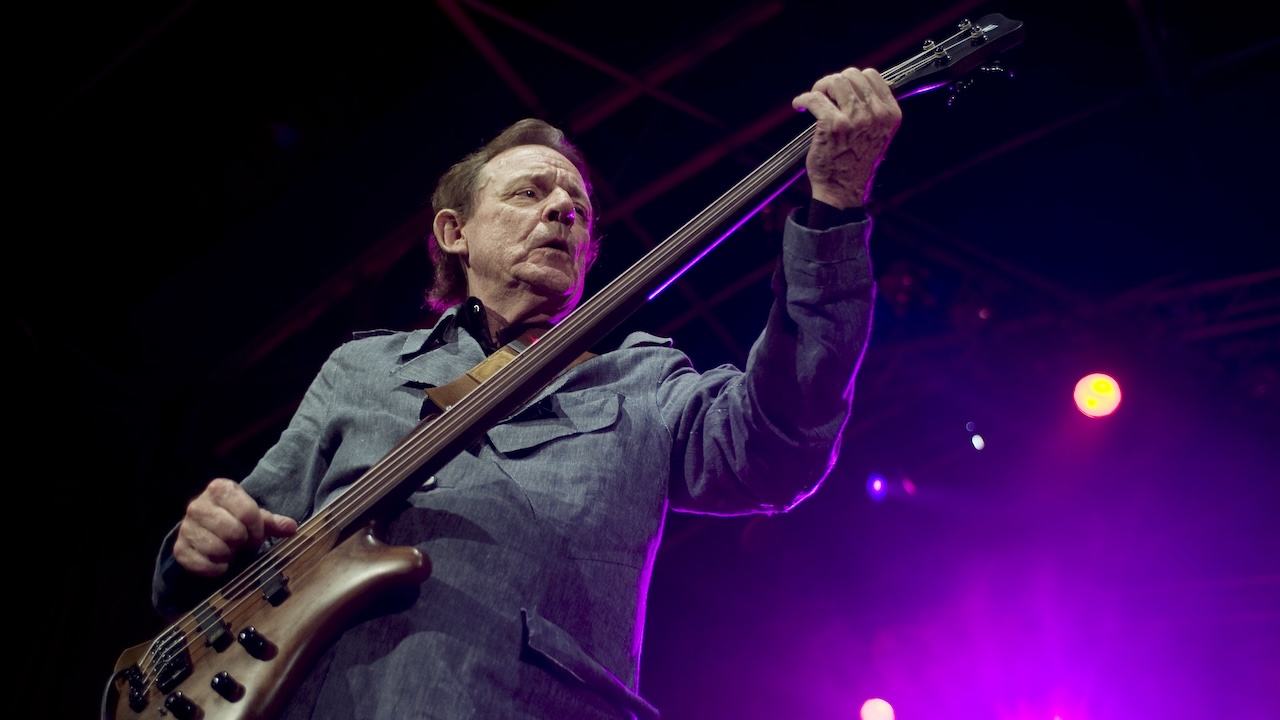
“You could argue there are two kinds of musicians,” the late Jack Bruce once told Bass Player. “The first type plays one thing to perfection and is satisfied. The other type is always searching.”
A dyed-in-the-wool member of the latter camp, Bruce grew up studying jazz on scholarship at the Royal Scottish Academy of Music, later establishing himself as a blues-rock pioneer along with Eric Clapton and Ginger Baker in Cream.
The experience prepared him to challenge rock audiences with flights of extended improvisation in the late '60s, leading to work with Tony Williams, the jazz drummer whose Lifetime bands laid the blueprint for jazz-rock fusion.
In 2008 Bruce began playing with the Tony Williams Lifetime Tribute Band, a group comprising drummer Cindy Blackman-Santana, keyboardist John Medeski, and guitarist Vernon Reid.
In a historic Bass Player interview, Bruce and Reid officially announced that the band was to be called Spectrum Road, and would continue to use the music of Lifetime as inspiration, both onstage and in the studio.
The following interview from the Bass Player archives took place in 2011.
How did you first come to play in the Tony Williams Lifetime?
“I was doing the first tour under my own name – Jack Bruce & Friends with Mitch Mitchell and Larry Coryell – and the first show was at the Fillmore East. Jimi Hendrix came down, as did John McLaughlin, who introduced me to Tony. Tony asked me to join Lifetime, and I immediately lost interest in my own band.”
That was a big move, adding your thump to a trio that was then riding high on the success of its album Emergency!
“There are a lot of purists who believe the best version of Lifetime was that trio: Williams, McLaughlin, and organist Larry Young. I loved that trio, as well, but the band moved up another step when I joined – especially live.”
You brought a bold bass guitar sound to a band that was used to having organ handle bass duties. How did you work that out with Larry and Tony?
“We didn't really talk about anything – we just played. The first tune was Vuelta Abajo. It was a kind of audition. Tony had written that out, and I sightread it. Tony seemed surprised; he didn't think a rocker would be able to do that.”
Did you tour first, and then make Turn It Over?
“Getting gigs for that band was a problem – it was so ahead of its time. We did a few gigs in the States, we did the recording, and then we did a pretty extensive European tour. That was about it, really. We more or less drifted apart.”
Can you provide some insights about the sessions?
“I just remember it was like when Cream started – we were trying to take live music into the studio, and for a producer like Tom Dowd, those Marshall stacks were a big shock. Lifetime was similar. It was all-out, full-bore music, and people weren't ready to record that yet.”
Through the years, you've developed an impressive array of plucking techniques. Where do they come from?
“I played a bit of flamenco guitar when I was a kid, but the inspiration in that regard actually comes from the percussion player in my own band. Something about the way he plays rhythms influences me to use a flamenco-style strum.”
At your San Francisco show, you occasionally whipped out a pick, which you used mostly for rubbing the strings.
“Yes, the pick is my new thing. As for rubbing, that was just in the moment, but I incorporate a lot of tremolo picking as well. It's kind of like a tribute to my father, who's a great mandolin player.”
You played some passages using your left thumb wrapped over the top of the neck to hit notes on the lowest string – much like Hendrix did.
“I do that in order to create certain chords that would be inaccessible otherwise.”
Do you sit down and practice these things?
“No, I don't practice much on bass guitar. I love to practice Bach's music on piano and cello, but playing bass is so natural to me – it's like breathing. I don't practice bass when I have a break, because then it's completely new again when I come back. I love that approach ... but it's also very lazy!”

What's the onstage dynamic with the other members of Spectrum Road?
"The great thing about playing with this group is that it feels like it's a conversation that flows freely among us. Vernon is our leader in the grand sense, but onstage it could be anybody at any time. Humility is very underrated.”
When Carlos Santana joined you onstage in San Francisco, he mentioned that listening to complex music such as Lifetime requires patience and takes acceptance. He challenged the audience.
“Our philosophy is that you have to please yourself first, and then the other members of the ensemble, and if that works then it's going to work with an audience. You can't be working the room first, regardless of what kind of music you're playing.”
Has the classic-rock generation finally matured to the point where loud jazz fusion can make a comeback in jazz clubs, rather than the older days of jazzing up rock venues?
“Labels aren't relevant to musicians – it's just about people playing together. Some of the greatest gigs I ever heard were Miles Davis's bands at European festivals. You don't need to call it anything – just phenomenal music.
“Regarding fusion, it ended up being played by a lot of people who were just going through the motions. All the music I'm involved in is based in blues. As far as I'm concerned, all great music has to have that blues element.”
Why do you feel that way?
“It comes down to struggle. I equate it with what's going on with the revolution in Egypt. The establishment is hanging on to the oppression of its people because it can. The music business is not that different; it's a form of censorship. There are people who have struggled against it, and that's how things move on.”
You're certainly one of those people. There weren't many players doing extended blues jams on rock stages before Cream came along.
"You could actually argue that Cream was the first fusion band, because Ginger and I were both jazz players. Eric was our Ornette Coleman – but we didn't tell him that! We had some great improvisations with that band. When it was hot, it was hot. Like Lifetime, it brought that intense, psychedelic feeling.”
Spectrum Road is fairly trippy as well.
"It's phenomenal. Every night is an adventure – an epic adventure.”







